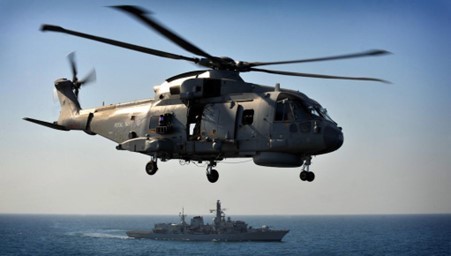Safran win Merlin Helicopter Engine Support Contract
The Royal Navy’s fleet of 55 Merlin helicopters is set to benefit from increased availability following a new engine support contract awarded to Safran Helicopter Engines UK. The £241 million, six-year contract, managed by Defence Equipment & Support (DE&S), will run through to 2030 and aims to ensure optimal performance of the helicopter’s RTM322 engine while supporting British jobs.
Starting on April 1, 2024, this contract promises an enhanced and flexible support system. It is designed to maximize the fleet’s availability by measuring success against agreed performance metrics. This initiative underscores the importance of the Merlin helicopters in executing critical roles such as UK maritime force protection, anti-submarine warfare, and amphibious medium lift operations.
The Royal Navy operates two variants of the Merlin helicopter. The MK2, in service since 2014, boasts advanced radar and sonar systems, making it a formidable submarine hunter. Additionally, it serves in various roles including maritime patrol, troop transport, casualty evacuation, search and rescue, and other contingency missions. Over the years, the Merlin MK2s have been deployed across various Royal Navy platforms, including the Queen Elizabeth Class carriers, Daring Class destroyers, Duke Class frigates, and RFA vessels.
On the other hand, the MK4 Merlin, tailored for the Royal Marines, comes with specific modifications. Notably, it features a fast-roping beam, enabling swift deployment of Special Forces directly from the main cabin door.

Marshall Extends C-130J Cockpit Contract
Marshall has announced an £11m extension to its existing contract with Lockheed Martin to produce and deliver cockpit trim panels for the C-130J Super Hercules aircraft.
With over 1,000 cockpit trim panel kits already supplied, Marshall has been a key contributor to every C-130J Super Hercules produced by Lockheed Martin. These kits include various components such as panel and reveal kits, as well as escape hatch and cover kits.
Manufactured using phenolic glass fibre sandwich structures with a Nomex honeycomb core, the panels undergo meticulous finishing processes that include painting, electrical assembly, and integration.
The extension underscores the enduring partnership between Lockheed Martin and Marshall, cemented over years of collaboration on the Super Hercules global fleet. This renewed contract not only solidifies their long-standing relationship but also paves the way for further collaboration in supporting the global C-130J operator community.
The delivery commitments for these cockpit trim panel kits are set to span from 2025 to the end of 2029, ensuring continued support and supply for the growing fleet of C-130J Super Hercules aircraft worldwide.

UKs £60m C-LEO Satellite Programme
The UK Space Agency has unveiled the Connectivity in Low Earth Orbit (C-LEO) programme, pledging up to £60 million to spur advancements in the country’s satellite communications sector. This initiative, announced in the recent Spring Budget, is part of a broader £160 million investment set to span the next four years.
The C-LEO programme comes on the heels of a record-breaking year in 2023, which saw over 2,900 satellites successfully launched worldwide. Most of these satellites are part of commercial constellations, signalling significant growth potential in the global space sector.
With the UK’s rich history in satellite design and manufacturing, the new government funding aims to reinforce the nation’s competitive position amid the rapid evolution of the space industry. This strategic investment is expected to open avenues for lucrative contracts within the global satellite constellation supply chain and position the UK as a frontrunner in the burgeoning low Earth orbit (LEO) market.
The programme’s focus extends beyond traditional satellite communications. By advancing these technologies, the UK aims to bolster emerging sectors like autonomous vehicles and drone-based healthcare deliveries. Additionally, the initiative aims to enhance connectivity in remote and underserved regions within the UK and globally.
Funding for innovative projects under the C-LEO programme will range up to £20 million per initiative, sourced from both the UK Space Agency and the European Space Agency’s Advanced Research in Telecommunications Systems (ARTES) programme.

Turner & Townsend to Oversee BAE’s Glasgow Shipyard Modernisation
BAE Systems has enlisted consulting firm Turner & Townsend to manage the construction of a new Ship Build Hall in Glasgow, marking a significant step in the defence giant’s £300 million modernisation plan for its shipbuilding facilities in Govan and Scotstoun.
The new facility, designed to accommodate two Type 26 frigates simultaneously, is already under construction and set for completion by Spring 2025. Turner & Townsend will serve as the New Engineering Contract (NEC) Project Manager, overseeing cost control and project management for the ambitious project.
The 170-metre long and 80-metre-wide hall forms part of BAE Systems’ £4.2 billion Ministry of Defence (MoD) contract to build five Type 26 warships. Following an initial contract for the first three vessels, the new Ship Build Hall aims to offer a weather-resistant environment for efficient and safe shipbuilding operations for years to come.
Designed to accommodate up to 500 workers per shift, the facility will integrate digital technologies such as tablets and kiosk screens to streamline construction processes. The construction of all eight frigates will take place at Govan and Scotstoun, supporting approximately 1,700 jobs in Scotland and additional roles within the wider UK supply chain.
Steven Jackson, director of Infrastructure, Scotland at Turner & Townsend, commented on the partnership: “BAE Systems’ investment in the long-term future of its Govan and Scotstoun facilities will transform and enhance shipbuilding in Glasgow. Our UK-wide expertise in the defence sector and in the delivery of major projects will play a key role in the development of this new facility.”
The Type 26 frigates, primarily designed for anti-submarine warfare, also offer capabilities for humanitarian aid and medical support. Construction on the first three ships is already underway, with testing and acceptance scheduled to occur at the Scotstoun site before final delivery to the Royal Navy.
That’s a wrap! Hope everyone is enjoying the longer days and has had a good Easter break.

